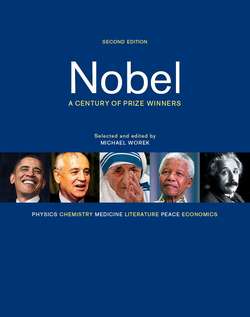Читать книгу Nobel - Michael Worek - Страница 18
На сайте Литреса книга снята с продажи.
ОглавлениеRobert Koch (1843–1910)
1905 Physiology or Medicine
For his investigations and discoveries in relation to tuberculosis.
Born in Clausthal, Germany, Robert Heinrich Hermann Koch was expected to become a shoemaker, but he showed methodical persistence and intelligence from a very early age. To the surprise of his parents, at five he taught himself to read by studying newspapers, and it became evident that he was destined to be more than a shoemaker. Koch’s distinctive drive and ambition led him to study medicine in the hope of becoming a doctor.
In high school he showed a great aptitude for biology and developed a desire to travel, which confirmed his early ambitions. In 1862 he enrolled at the University of Göttingen to study medicine. When he finished his studies four years later he practiced medicine in various places around Germany until 1870, when he volunteered for the Franco-Prussian War.
After the war Koch realized that his vocation lay in a different field, the natural sciences; although abandoning his career as a doctor, a resolve to help the needy was still foremost in the young German’s mind. Researching the causes of disease and their prevention soon occupied his time.
Koch was in Wollstein when an anthrax epidemic attacked the farm animals in the district, and he immediately decided to analyze the disease. His wife had given him a new microscope for his 28th birthday, which greatly enriched the poorly equipped laboratory in the couple’s apartment. Koch worked without other adequate scientific equipment, access to libraries or contact with other scientists.
Around 1880 his studies on the anthrax bacteria earned him a job in the Reichs-Gesundheitsamt (the Imperial Health Bureau) laboratories in Berlin. Initially he was given a small, insufficient laboratory but soon was moved into better surroundings, where he worked with assistants. A few years after arriving in Berlin, Koch discovered tubercle bacillus, now known as Koch’s bacillus. This research was of such importance to the scientific field that it earned him the 1905 Nobel Prize in Physiology or Medicine.
Although perhaps best known for his work on tuberculosis, Robert Koch dedicated valuable research time to a number of human and animal diseases, including cholera, leprosy, bovine plague, bubonic plague and malaria. These studies allowed him to realize his early dreams of traveling, and he spent considerable periods in Egypt, India, Africa and Italy doing research.
